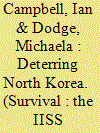| Srl | Item |
| 1 |
ID:
182037


|
|
|
|
|
| Summary/Abstract |
Resurgent expressions of an “action-reaction” arms race narrative and its corollary “inaction-inaction” narrative are the basis for frequent assertions that if the United States would only stop its nuclear programs, opponents would also stop building their nuclear force—and a “peace race” would ensue. In other words, U.S. efforts to maintain its deterrence capabilities are seen as sparking or accelerating the “arms race.” This argument has its roots in the 1960s; it has not changed since then. This same claim is now leveled at the contemporary and much-delayed U.S. nuclear modernization program. As in the past, the claim now commonly expressed is that current U.S. efforts to preserve its strategic deterrence forces are the cause of a new action-reaction arms race cycle and should, therefore, be stopped. However, history disproves the action-reaction/inaction-inaction narrative. An examination of numerous documents regarding the development of U.S. strategic policy—including now-declassified governmental and unclassified non-governmental studies and books that that have closely examined this issue—and interviews with a bipartisan group of former officials and knowledgeable academics demonstrates the flaws in this narrative and sets the record straight regarding U.S. policy developments and the factors that drove those developments.
|
|
|
|
|
|
|
|
|
|
|
|
|
|
|
|
| 2 |
ID:
182002


|
|
|
|
|
| Summary/Abstract |
Professor Colin S. Gray dedicated his life to a careful examination of international relations and factors that influence states’ foreign policy and defense choices, among other topics in his excellent scholarship. He was keenly aware of limits of historical understanding for making too confident statements about what the future holds,1 yet Professor Gray’s writings leave one impressed with his prescience. “The future is the past in the ways that matter most,” he wrote in one of his publications and one cannot but think there is a lot of truth to that statement.2 Professor Gray’s selected thoughts on nuclear arms races and arms control, with which this article is concerned, are but a sliver of his extensive and most impressive scholarship on a variety of national security topics.
|
|
|
|
|
|
|
|
|
|
|
|
|
|
|
|
| 3 |
ID:
170577


|
|
|
|
|
| Summary/Abstract |
If conventional deterrence fails, the US must be able to terminate war on favourable terms.
|
|
|
|
|
|
|
|
|
|
|
|
|
|
|
|
| 4 |
ID:
175677


|
|
|
|
|
| Summary/Abstract |
The article highlights Russia’s influence operations in the Czech Republic during U.S.-Czech ballistic missile defense discussions and negotiations between 2002 and 2011. Russia’s influence operations are an example of its first successful effort on a new North Atlantic Treaty Organization member state territory. They are significant because Russia will use similar approaches in other states and the United States must understand them before it can successfully counter them. This is a first public comprehensive effort to map them in connection to U.S.-Czech radar negotiations and draw conclusions for U.S. and allied foreign and defense policies.
|
|
|
|
|
|
|
|
|
|
|
|
|
|
|
|
| 5 |
ID:
175687


|
|
|
|
|
| Summary/Abstract |
The article identifies factors that impacted ballistic missile defense cooperation between the Czech Republic and the United States after 2002 when the United States withdrew from the Anti-Ballistic Missile Treaty. It draws insights regarding a broader question of why countries of disproportionate capabilities cooperate on defense-related matters despite gaining asymmetric benefits. How does such cooperation occur is relevant for the United States as it cooperates on ballistic missile defense with about 20 countries worldwide. The article makes contributions to literature on alliance politics and management. The case study illustrates that defense cooperation between two countries can result in similar outcomes as if their threat perceptions were the same even when they differ and highlights a critical role and importance of domestic politics on defense negotiations. The article offers several actionable policy recommendations.
|
|
|
|
|
|
|
|
|
|
|
|
|
|
|
|